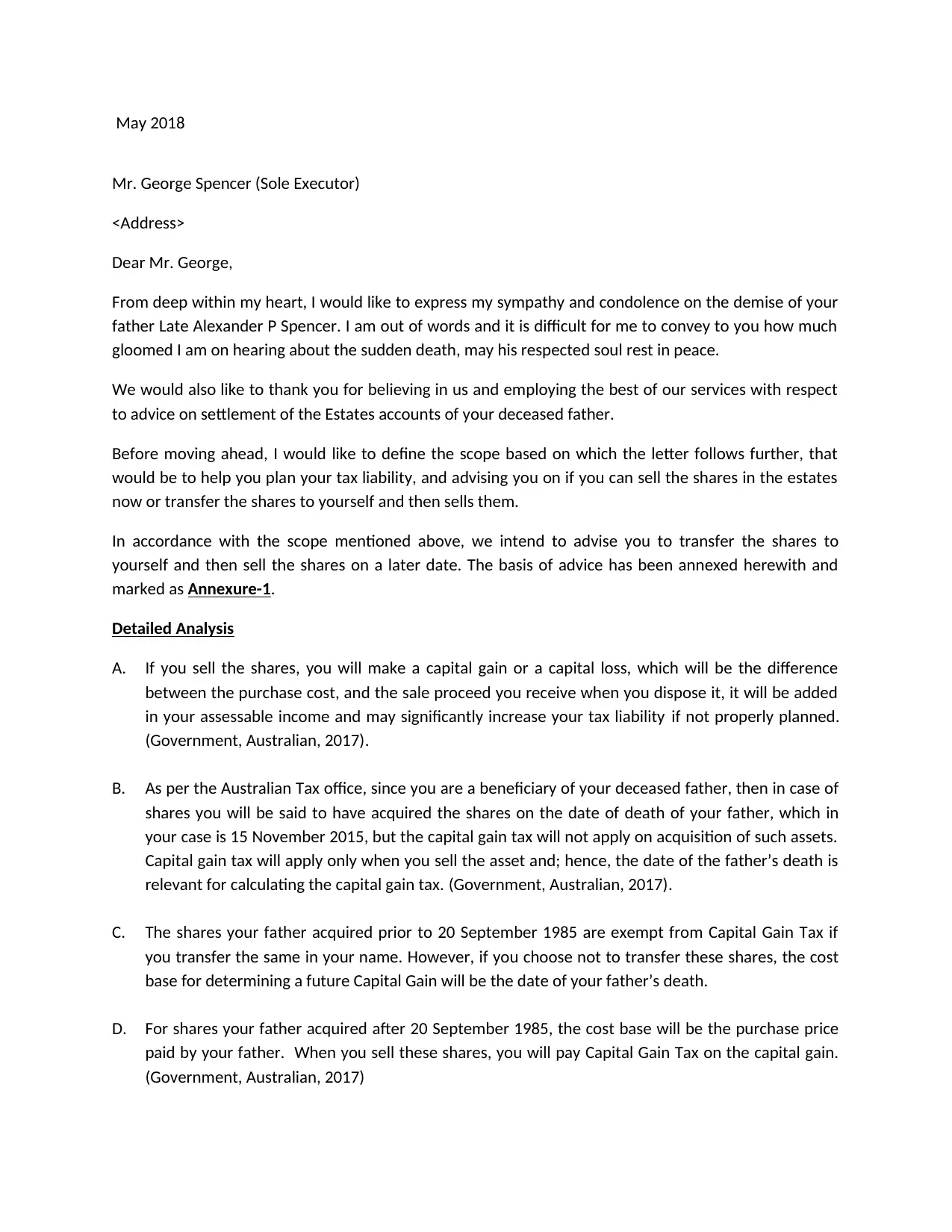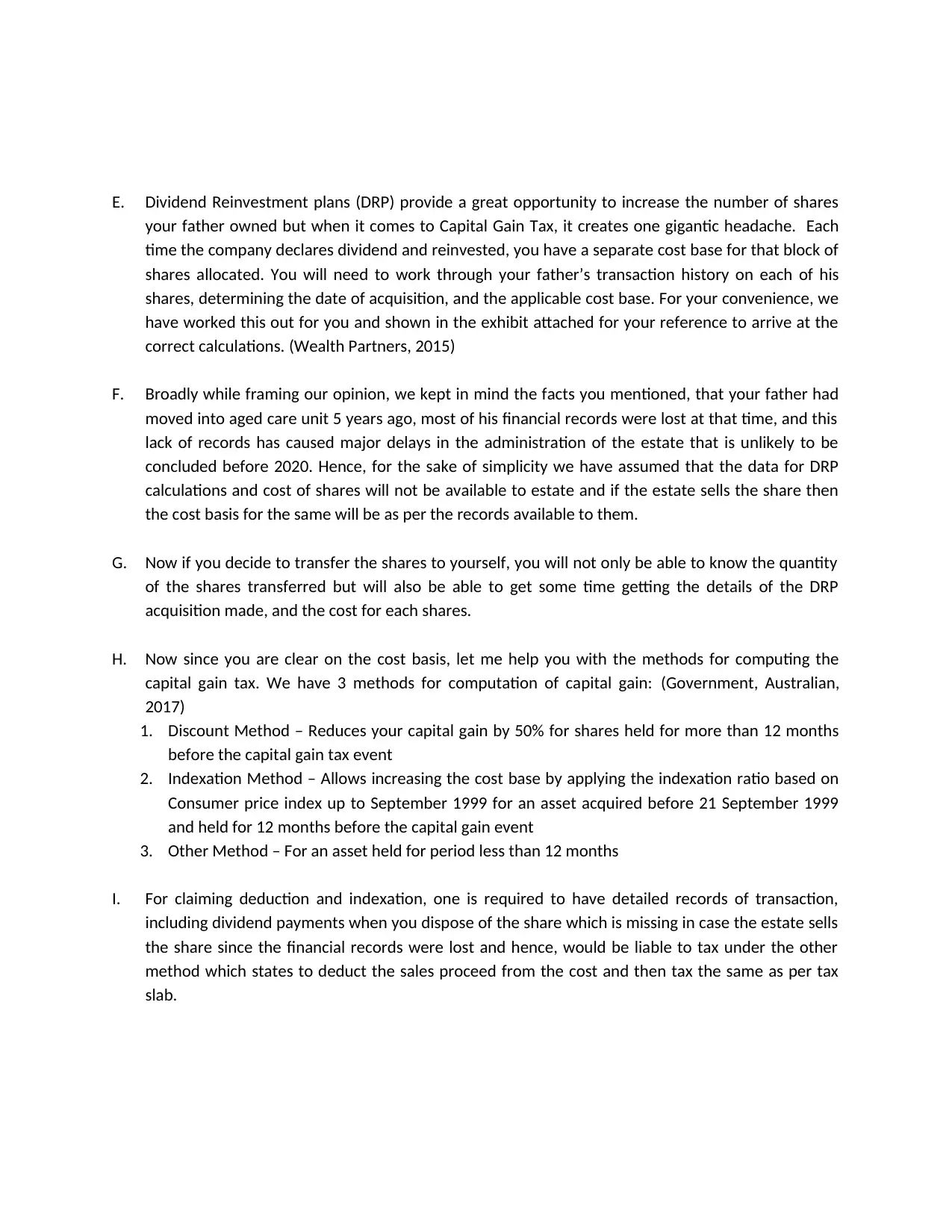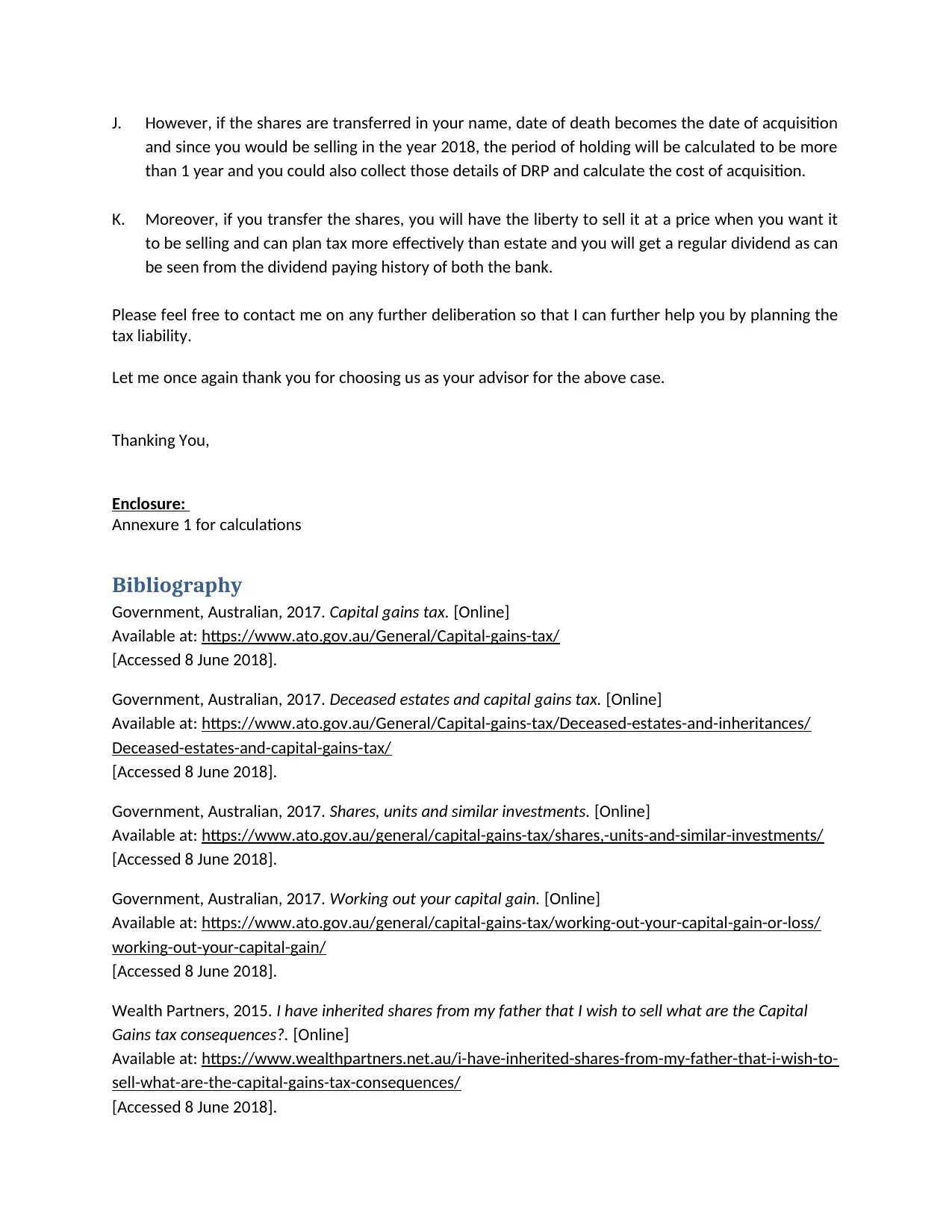Estate Account Settlement: Tax Planning and Share Management Advice
VerifiedAdded on 2023/06/11
|4
|1297
|363
Report
AI Summary
This report offers guidance to Mr. George Spencer, the sole executor and beneficiary of his father's estate, on managing the estate's shares for optimal tax outcomes. It analyzes the implications of selling the shares directly versus transferring them to Mr. Spencer before selling. The report considers factors like the date of share acquisition, the availability of financial records, and the potential benefits of utilizing discount and indexation methods for calculating capital gains tax. It recommends transferring the shares to Mr. Spencer to allow for better tax planning, access to dividend reinvestment plan (DRP) details, and control over the timing of the sale, referencing relevant Australian Taxation Office guidelines and case studies. The report also details three methods for computing capital gains tax, advising on the importance of detailed transaction records for claiming deductions and indexation.

May 2018
Mr. George Spencer (Sole Executor)
<Address>
Dear Mr. George,
From deep within my heart, I would like to express my sympathy and condolence on the demise of your
father Late Alexander P Spencer. I am out of words and it is difficult for me to convey to you how much
gloomed I am on hearing about the sudden death, may his respected soul rest in peace.
We would also like to thank you for believing in us and employing the best of our services with respect
to advice on settlement of the Estates accounts of your deceased father.
Before moving ahead, I would like to define the scope based on which the letter follows further, that
would be to help you plan your tax liability, and advising you on if you can sell the shares in the estates
now or transfer the shares to yourself and then sells them.
In accordance with the scope mentioned above, we intend to advise you to transfer the shares to
yourself and then sell the shares on a later date. The basis of advice has been annexed herewith and
marked as Annexure-1.
Detailed Analysis
A. If you sell the shares, you will make a capital gain or a capital loss, which will be the difference
between the purchase cost, and the sale proceed you receive when you dispose it, it will be added
in your assessable income and may significantly increase your tax liability if not properly planned.
(Government, Australian, 2017).
B. As per the Australian Tax office, since you are a beneficiary of your deceased father, then in case of
shares you will be said to have acquired the shares on the date of death of your father, which in
your case is 15 November 2015, but the capital gain tax will not apply on acquisition of such assets.
Capital gain tax will apply only when you sell the asset and; hence, the date of the father’s death is
relevant for calculating the capital gain tax. (Government, Australian, 2017).
C. The shares your father acquired prior to 20 September 1985 are exempt from Capital Gain Tax if
you transfer the same in your name. However, if you choose not to transfer these shares, the cost
base for determining a future Capital Gain will be the date of your father’s death.
D. For shares your father acquired after 20 September 1985, the cost base will be the purchase price
paid by your father. When you sell these shares, you will pay Capital Gain Tax on the capital gain.
(Government, Australian, 2017)
Mr. George Spencer (Sole Executor)
<Address>
Dear Mr. George,
From deep within my heart, I would like to express my sympathy and condolence on the demise of your
father Late Alexander P Spencer. I am out of words and it is difficult for me to convey to you how much
gloomed I am on hearing about the sudden death, may his respected soul rest in peace.
We would also like to thank you for believing in us and employing the best of our services with respect
to advice on settlement of the Estates accounts of your deceased father.
Before moving ahead, I would like to define the scope based on which the letter follows further, that
would be to help you plan your tax liability, and advising you on if you can sell the shares in the estates
now or transfer the shares to yourself and then sells them.
In accordance with the scope mentioned above, we intend to advise you to transfer the shares to
yourself and then sell the shares on a later date. The basis of advice has been annexed herewith and
marked as Annexure-1.
Detailed Analysis
A. If you sell the shares, you will make a capital gain or a capital loss, which will be the difference
between the purchase cost, and the sale proceed you receive when you dispose it, it will be added
in your assessable income and may significantly increase your tax liability if not properly planned.
(Government, Australian, 2017).
B. As per the Australian Tax office, since you are a beneficiary of your deceased father, then in case of
shares you will be said to have acquired the shares on the date of death of your father, which in
your case is 15 November 2015, but the capital gain tax will not apply on acquisition of such assets.
Capital gain tax will apply only when you sell the asset and; hence, the date of the father’s death is
relevant for calculating the capital gain tax. (Government, Australian, 2017).
C. The shares your father acquired prior to 20 September 1985 are exempt from Capital Gain Tax if
you transfer the same in your name. However, if you choose not to transfer these shares, the cost
base for determining a future Capital Gain will be the date of your father’s death.
D. For shares your father acquired after 20 September 1985, the cost base will be the purchase price
paid by your father. When you sell these shares, you will pay Capital Gain Tax on the capital gain.
(Government, Australian, 2017)
Paraphrase This Document
Need a fresh take? Get an instant paraphrase of this document with our AI Paraphraser

E. Dividend Reinvestment plans (DRP) provide a great opportunity to increase the number of shares
your father owned but when it comes to Capital Gain Tax, it creates one gigantic headache. Each
time the company declares dividend and reinvested, you have a separate cost base for that block of
shares allocated. You will need to work through your father’s transaction history on each of his
shares, determining the date of acquisition, and the applicable cost base. For your convenience, we
have worked this out for you and shown in the exhibit attached for your reference to arrive at the
correct calculations. (Wealth Partners, 2015)
F. Broadly while framing our opinion, we kept in mind the facts you mentioned, that your father had
moved into aged care unit 5 years ago, most of his financial records were lost at that time, and this
lack of records has caused major delays in the administration of the estate that is unlikely to be
concluded before 2020. Hence, for the sake of simplicity we have assumed that the data for DRP
calculations and cost of shares will not be available to estate and if the estate sells the share then
the cost basis for the same will be as per the records available to them.
G. Now if you decide to transfer the shares to yourself, you will not only be able to know the quantity
of the shares transferred but will also be able to get some time getting the details of the DRP
acquisition made, and the cost for each shares.
H. Now since you are clear on the cost basis, let me help you with the methods for computing the
capital gain tax. We have 3 methods for computation of capital gain: (Government, Australian,
2017)
1. Discount Method – Reduces your capital gain by 50% for shares held for more than 12 months
before the capital gain tax event
2. Indexation Method – Allows increasing the cost base by applying the indexation ratio based on
Consumer price index up to September 1999 for an asset acquired before 21 September 1999
and held for 12 months before the capital gain event
3. Other Method – For an asset held for period less than 12 months
I. For claiming deduction and indexation, one is required to have detailed records of transaction,
including dividend payments when you dispose of the share which is missing in case the estate sells
the share since the financial records were lost and hence, would be liable to tax under the other
method which states to deduct the sales proceed from the cost and then tax the same as per tax
slab.
your father owned but when it comes to Capital Gain Tax, it creates one gigantic headache. Each
time the company declares dividend and reinvested, you have a separate cost base for that block of
shares allocated. You will need to work through your father’s transaction history on each of his
shares, determining the date of acquisition, and the applicable cost base. For your convenience, we
have worked this out for you and shown in the exhibit attached for your reference to arrive at the
correct calculations. (Wealth Partners, 2015)
F. Broadly while framing our opinion, we kept in mind the facts you mentioned, that your father had
moved into aged care unit 5 years ago, most of his financial records were lost at that time, and this
lack of records has caused major delays in the administration of the estate that is unlikely to be
concluded before 2020. Hence, for the sake of simplicity we have assumed that the data for DRP
calculations and cost of shares will not be available to estate and if the estate sells the share then
the cost basis for the same will be as per the records available to them.
G. Now if you decide to transfer the shares to yourself, you will not only be able to know the quantity
of the shares transferred but will also be able to get some time getting the details of the DRP
acquisition made, and the cost for each shares.
H. Now since you are clear on the cost basis, let me help you with the methods for computing the
capital gain tax. We have 3 methods for computation of capital gain: (Government, Australian,
2017)
1. Discount Method – Reduces your capital gain by 50% for shares held for more than 12 months
before the capital gain tax event
2. Indexation Method – Allows increasing the cost base by applying the indexation ratio based on
Consumer price index up to September 1999 for an asset acquired before 21 September 1999
and held for 12 months before the capital gain event
3. Other Method – For an asset held for period less than 12 months
I. For claiming deduction and indexation, one is required to have detailed records of transaction,
including dividend payments when you dispose of the share which is missing in case the estate sells
the share since the financial records were lost and hence, would be liable to tax under the other
method which states to deduct the sales proceed from the cost and then tax the same as per tax
slab.

J. However, if the shares are transferred in your name, date of death becomes the date of acquisition
and since you would be selling in the year 2018, the period of holding will be calculated to be more
than 1 year and you could also collect those details of DRP and calculate the cost of acquisition.
K. Moreover, if you transfer the shares, you will have the liberty to sell it at a price when you want it
to be selling and can plan tax more effectively than estate and you will get a regular dividend as can
be seen from the dividend paying history of both the bank.
Please feel free to contact me on any further deliberation so that I can further help you by planning the
tax liability.
Let me once again thank you for choosing us as your advisor for the above case.
Thanking You,
Enclosure:
Annexure 1 for calculations
Bibliography
Government, Australian, 2017. Capital gains tax. [Online]
Available at: https://www.ato.gov.au/General/Capital-gains-tax/
[Accessed 8 June 2018].
Government, Australian, 2017. Deceased estates and capital gains tax. [Online]
Available at: https://www.ato.gov.au/General/Capital-gains-tax/Deceased-estates-and-inheritances/
Deceased-estates-and-capital-gains-tax/
[Accessed 8 June 2018].
Government, Australian, 2017. Shares, units and similar investments. [Online]
Available at: https://www.ato.gov.au/general/capital-gains-tax/shares,-units-and-similar-investments/
[Accessed 8 June 2018].
Government, Australian, 2017. Working out your capital gain. [Online]
Available at: https://www.ato.gov.au/general/capital-gains-tax/working-out-your-capital-gain-or-loss/
working-out-your-capital-gain/
[Accessed 8 June 2018].
Wealth Partners, 2015. I have inherited shares from my father that I wish to sell what are the Capital
Gains tax consequences?. [Online]
Available at: https://www.wealthpartners.net.au/i-have-inherited-shares-from-my-father-that-i-wish-to-
sell-what-are-the-capital-gains-tax-consequences/
[Accessed 8 June 2018].
and since you would be selling in the year 2018, the period of holding will be calculated to be more
than 1 year and you could also collect those details of DRP and calculate the cost of acquisition.
K. Moreover, if you transfer the shares, you will have the liberty to sell it at a price when you want it
to be selling and can plan tax more effectively than estate and you will get a regular dividend as can
be seen from the dividend paying history of both the bank.
Please feel free to contact me on any further deliberation so that I can further help you by planning the
tax liability.
Let me once again thank you for choosing us as your advisor for the above case.
Thanking You,
Enclosure:
Annexure 1 for calculations
Bibliography
Government, Australian, 2017. Capital gains tax. [Online]
Available at: https://www.ato.gov.au/General/Capital-gains-tax/
[Accessed 8 June 2018].
Government, Australian, 2017. Deceased estates and capital gains tax. [Online]
Available at: https://www.ato.gov.au/General/Capital-gains-tax/Deceased-estates-and-inheritances/
Deceased-estates-and-capital-gains-tax/
[Accessed 8 June 2018].
Government, Australian, 2017. Shares, units and similar investments. [Online]
Available at: https://www.ato.gov.au/general/capital-gains-tax/shares,-units-and-similar-investments/
[Accessed 8 June 2018].
Government, Australian, 2017. Working out your capital gain. [Online]
Available at: https://www.ato.gov.au/general/capital-gains-tax/working-out-your-capital-gain-or-loss/
working-out-your-capital-gain/
[Accessed 8 June 2018].
Wealth Partners, 2015. I have inherited shares from my father that I wish to sell what are the Capital
Gains tax consequences?. [Online]
Available at: https://www.wealthpartners.net.au/i-have-inherited-shares-from-my-father-that-i-wish-to-
sell-what-are-the-capital-gains-tax-consequences/
[Accessed 8 June 2018].
⊘ This is a preview!⊘
Do you want full access?
Subscribe today to unlock all pages.

Trusted by 1+ million students worldwide

1 out of 4
Related Documents
Your All-in-One AI-Powered Toolkit for Academic Success.
+13062052269
info@desklib.com
Available 24*7 on WhatsApp / Email
![[object Object]](/_next/static/media/star-bottom.7253800d.svg)
Unlock your academic potential
Copyright © 2020–2026 A2Z Services. All Rights Reserved. Developed and managed by ZUCOL.




